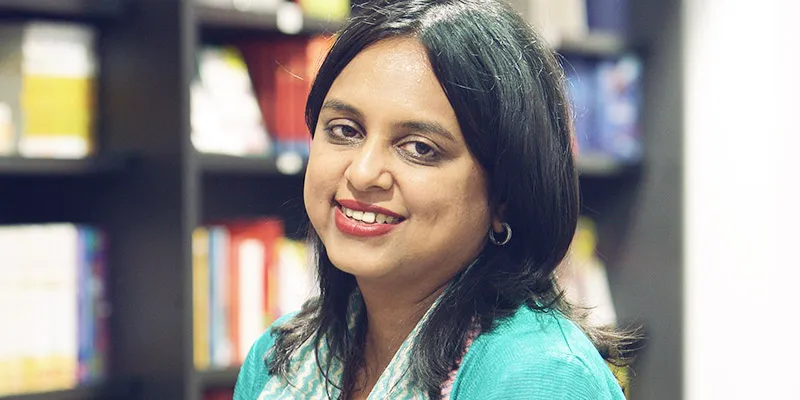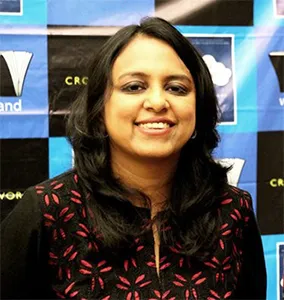‘Young people should experiment with life, have a dream and make it come true,’ - Rashmi Bansal
Rashmi Bansal’s latest offering, Arise, Awake is out on the stands. An author who has written exclusively about entrepreneurs and entrepreneurship, she took to entrepreneurship herself last year with Bloody Good Books.
With multiple books on entrepreneurship and interaction with young students, she has great insights to offer about the ecosystem. HerStory spoke with her to know more about her life and understand more about the subjects of her books.

Early years
Born to an astrophysicist father, Rashmi Bansal grew up in the Tata Institute of Fundamental Research (TIFR) located at the very tip of South Bombay, she says, “It was an amazing place to grow up.” Her schooling from St Joseph’s High School and R C Church (Colaba) was later followed by higher education at Sophia College and then IIM-A from where she did her MBA.
As a bright student — the class topper with thick spectacles who hardly talked to anyone — Rashmi reveals that she was always seen reading books but they weren’t school textbooks as people assumed, but novels.
Since she did not like mathematics, she decided to take up arts in college and went on to do a BA in economics. Those were the days when three career options – engineering from IIT, medicine or a PhD in the US (on full scholarship) were the popular career options in the colony Rashmi was raised in. When she decided not to pick either of these options the usual reactions followed. She people would tell her, ‘Arrey – used to be so intelligent – what happened!’ But somehow I knew, I was on the right path.”
On being an author
Rashmi has been writing since her college days, and after her MBA started her own publishing company — JAM.
The idea for her first book, Stay Hungry Stay Foolish, came from Prof. Rakesh Basant at CIIE, IIM Ahmedabad (Centre for Innovation, Incubation & Entrepreneurship). “I thought it would be exciting to meet 25 entrepreneurs and hear their stories. It was a fantastic personal learning experience and I conveyed the spirit and energy of that experience through the medium of my book.” Generally in her introductions she does bring out some personal aspect of her life. “I am the observer and the observer is also a little bit part of the narrative.”
Rashmi looks out for stories that are multi-dimensional, where the entrepreneur has experienced several ups and downs in life. Primarily, she is interested in first generation entrepreneurs who have started a business without family support.
“Beyond this, I really cannot say what attracts me to a particular story. It has to be credible, relatable, honest and interesting. Also I look for a mix of locations, educational and cultural backgrounds because everyone who reads my book should feel there is ‘someone like me’ featured there.”
Inspiration for books
Rashmi seeks inspiration for her books in her travels across the country, visiting 80-100 schools and colleges each year. “There is so much passion in young people but they don’t know what direction to take. And yet, at every campus, there are a few young people who have the courage to be bold, be different. Their stories inspired me to write ‘Arise Awake’.
Her latest book, ‘Arise Awake’ is the story of student entrepreneurs who started a company while still in college.
“My message to young people is to experiment with life, to have a dream and make it come true. In college, you work for fun, you work to prove yourself and to earn some pocket money. But your idea could very well take off and provide an alternative to taking placement. It all starts when you seize the moment!”
Entrepreneurs
All entrepreneurs she has met have displayed three common traits — passion, purpose and perseverance — and to this she adds, an insane amount of self-belief.
She feels that there is more exposure to the idea of entrepreneurship at the college level and in the media than before. A lot more events and seminars, business plan competitions etc. are being hosted as well, but she still finds that most colleges are doing events just for the sake. She is quick to point out that entrepreneurship is not a theoretical subject, but a practical one. According to her, students should be encouraged to operate small businesses on campus and she says, “As a nation we should aim for 10% of students in every batch to become entrepreneurs right after graduation.”
Women entrepreneurs
Her book Follow Every Rainbow was about women. Rashmi shares that the primary purpose of writing the book was to look at women who have decided to have both a family and business; to explore the universal challenge women face regarding work, life balance.
One of the important points she makes is that a lot of women opt for businesses that scale slowly and over time. She says, “It is not that women are not ambitious or lack the capability, but many of them don’t scale businesses rapidly to maintain balance in life. As the children grow, the business grows. This allows women to manage everything better.”
Based on her experience of women entrepreneurs, Rashmi explains that in many cases where the business is scaled to a large extent there is involvement of family members too because bringing in the family provides a body/group of people who you can trust.
Finance is one area where she thinks women are less involved and this problem stems from a variety of factors. There is a lack of role models; many women have never seen their mothers or other women in the family handle finance, and many girls at a young age have not been taught to handle finance. Often women are not stopped from handling finance but it is something they just choose to leave to the men.
Women need to know money; talking about money, raising money and going to investors etc. is important. It is important not to let any of these factors hamper your business.
Balancing act
Given that she is travelling extensively, Rashmi needs to find a balance between her own responsibilities. When asked how she manages, she says, “I don’t think I manage it that well and sometimes it becomes

more than what I’d like it to be. But I try and prioritize things. To be honest, I don’t do much household work. But it’s not possible for anyone to have everything. I think a lot of it has to do with your mental composure and how to stay calm no matter what happens.”Since she is not working with somebody else it gives her much needed flexibility to do things her way and that according to her is a big advantage.
The role of investors in boosting entrepreneurship
According to her, investors can help in networking and making connections and provide mentorship.
“They do not have to be very closely involved (like in daily activities) but can guide the entrepreneur and provide them with the big picture and motivate and encourage them as well. It is a delicate balance and you have to hold their hand but you can’t push them. If the entrepreneur and the core team is not motivated and doesn’t feel that they are in-charge and are not leading the business then they may not be able to go very far.”
Three key recommendations for improving the startup ecosystem in India
According to Rashmi, the three key recommendations are:
The right people to provide mentorship. Someone who has gone through the journey and can share their experience.
Secondly, it is important to get young entrepreneurs who are full of energy and ideas. The interaction between students and these mentors through seminars etc. is essential to ensure that students get wiser by these first hand experiences of entrepreneurs. The practical aspect or the hands-on experience is important than just theoretical knowledge. Allowing young students to manage small businesses, say even run the canteen etc. gives them exposure and is a good learning experience.
Banks should be more approachable and be ready to offer micro-credit to young entrepreneurs. Even though the government has come up schemes to help entrepreneurs, many bank managers are still conditioned to think in terms of a business-product, machinery or an industry. They need to be trained about new concepts of business – train so they can understand new concepts of business. This will help entrepreneurs to get small funding they require initially.
Future projects
Rashmi is working on two books — one is on Akshaya Patra Foundation which is a story of how management gurus and spiritual gurus have come together to create India’s largest mid-day meal program. The second is in collaboration with Zee TV where she will be curating stories sent in by their viewers on the theme of ‘Ummeed’ (hope). The idea is to inspire, “the aam aadmi, aam aurat to have a vision and mission in life, no matter what the circumstances,” she says.







